How AI Business Process Automation is Transforming Modern Businesses?
November 27, 2024 • 180 Views • 23 min read
Tetiana Stoyko
CTO & Co-Founder
The artificial intelligence revolution, which took place just a few years ago, drastically changed the modern software industry. Many such open-sourced AI solutions are commonly used for AI business process automation.
However, before discussing AI-powered business process automation, we should define ground terms and processes related to artificial intelligence and its potential role in streamlined business operations.
What is AI Business Process Automation?
First, we should understand what AI solutions are suited for BPA and what exact business processes can and should be automated.
Modern business process automation with AI is possible thanks to open-sourced Natural Language Processing models (NLP) based on advanced chatbots. To rephrase, even the most advanced AI solutions, capable of real-time conversations and built-in voice recognition, are driven by chatbots with advanced features.
Frankly, designing and developing a new AI model is a very complex and resource-intensive task that requires a lot of time and effort, as well as a full-fledged software team familiar with such technologies. However, any modern AI automation service can be achieved using artificial intelligence examples like ChatGPT.
Besides, OpenAI offers its AI product as an open-source solution, making it extremely simple and fast to integrate and train according to your business needs. This strategy is a win-win because various companies and individuals gain access to advanced functionality and AI-driven services while helping OpenAI train its NLP model.
Summing up all the above, analysts expect the BPA market to reach 41.8 billion US dollars by 2033. AI business process automation will be one of the significant BPA market shares due to its undeniable advantage over other process automation practices.
To prove our point, let’s consider some of the existing key use cases of AI-powered business process automation.
Key Use Cases of AI in Business Process Automation
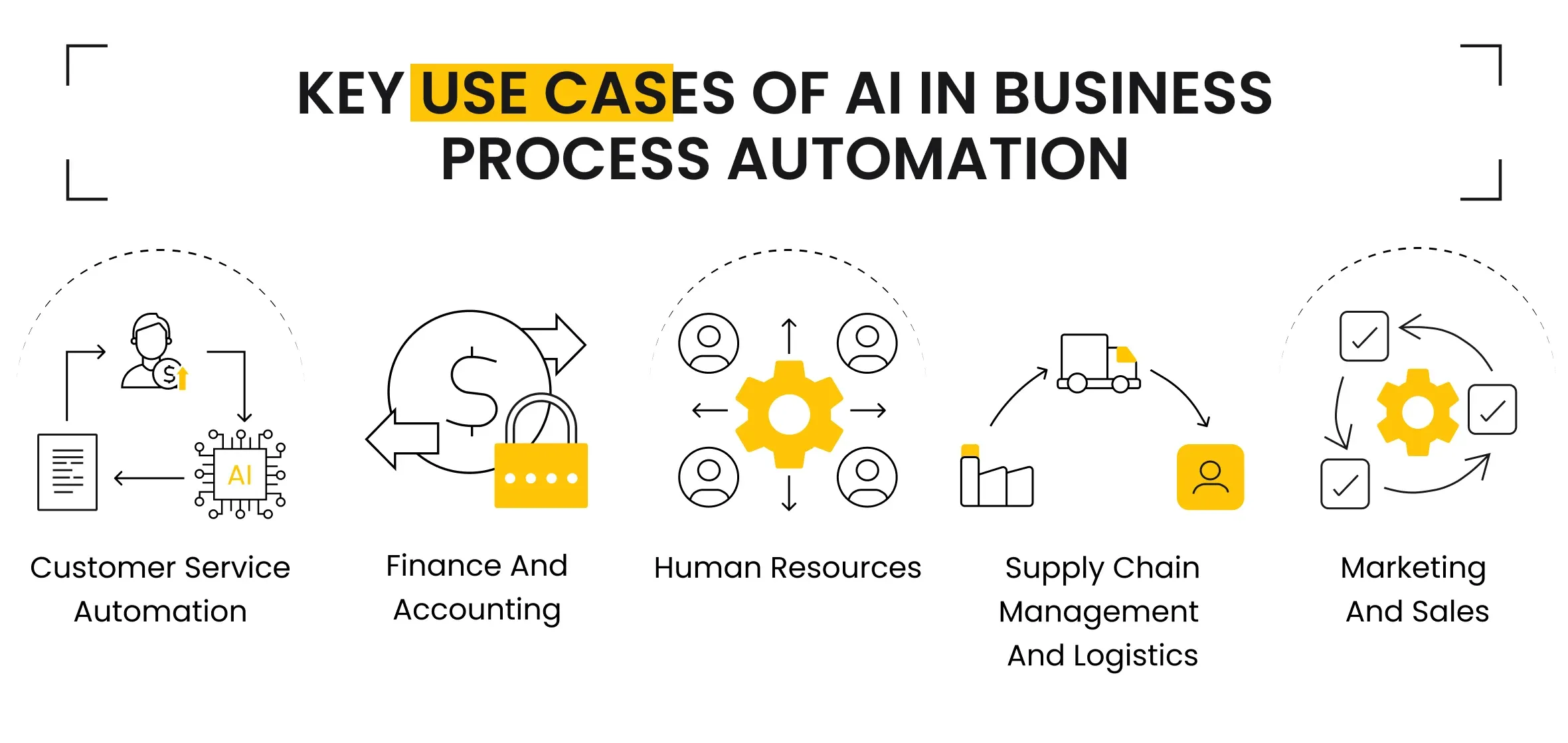
AI business process automation services can already be seen in many business software solutions. However, the most common fields where it is a popular and efficient solution are:
- Customer Service Automation
- Finance and Accounting
- Human Resources
- Supply Chain Management And Logistics
- Marketing and Sales
However, this doesn’t mean these process automation options are the only use cases for AI business integration. Don’t forget that AI solutions are very general and flexible. They can be tailored to almost any business need and requirement. The only limitations for such adjustments are the experience of your development team and the built-in boundaries of chosen AI models.
Customer Service Automation
One of the most apparent use cases for AI business process automation is customer support services and related operations.
As mentioned, modern AI business automation solutions are based on advanced chatbots. At the same time, most customer support services take place in chats. Thus, such operations automation is effortless and requires almost no extra coding and functionality adjustments.
In other words, all your business will need to enable such process automation is to engage AI developers in team extension services so they can integrate an AI module, adjust it according to your business specifics, and satisfy your needs.
Regardless of the efficiency and complexity of such chatbot integrations, you can’t automate all customer support services: some unique or complex requests require the involvement of customer support specialists. Still, even partial automation significantly helps save costs and efforts and achieves cost efficiency by redirecting human resources to more prioritized tasks.
Finance and Accounting
The following prominent example of AI for business process automation is its use in finance and accounting operations.
For instance, there are a few examples of AI fraud detection. Long story short, finance management and accounting processes are data-driven. At the same time, artificial intelligence shows excellent capabilities in defining and recognizing patterns and similarities, as well as processing vast arrays of data.
As a result, AI integrations are one of the best ways to improve finance and accounting operations. They can recognize potential fraudulent activities or trends and highlight other templates.
Long story short, using AI for automation is a great solution for finance-related processes or other data-dependent operations. Excellent data processing and analysis capabilities are among the most crucial advantages of choosing AI to automate business processes. Besides, it helps to avoid human factors and related mistakes.
Human Resources
The impact of business process automation is evident in the case of human resources.
Process automation is usually used to streamline repetitive tasks requiring human involvement. So, when automating business processes, your company can free several specialists and reassign them to other tasks that can’t be streamlined.
As a result, by using AI to automate tasks, businesses can simultaneously save costs and achieve better efficiency. To rephrase, business process automation saves time and resources, helps to avoid human errors, and boosts the efficiency of different operations, such as data analysis.
The list of these benefits is extensive, making many companies consider AI business process automation for their needs. To make a step further, we can also suggest that such technologies can be used to manage human resources:
Apart from automated business processes, AI solutions can examine ongoing and future tasks, analyze and prioritize them, and make more balanced choices about whom and how to assign each task.
Supply Chain Management And Logistics
Supply chain management and logistics software solutions require dealing with massive data arrays. AI is a powerful data processing and management tool, making it one of the best solutions for these industries.
For instance, some industry giants are already working on adapting innovative solutions, like blockchain, smart contracts, new-age tracking devices, and artificial intelligence. Supply chains and logistics have much in common with the Internet of Things (IoT): such businesses require as much data about their parcels and other goods or objects as possible. Nowadays, the only way to track a moving object is by combining software and hardware.
For illustration, when you order Domino's pizza or use Glovo, you know the possibility of tracking your delivery. While Domino’s only updates the status of your delivery, Glovo uses access to the courier’s phone and GPS position, displaying it to the customers.
AI integration can upgrade these processes even more by accessing real-time information about supply chains, delivery statuses, etc. Moreover, using AI in supply chains can offer a much deeper analysis in addition to advanced tracking. This helps to define and pinpoint supply bottlenecks and any other issues or challenges that appear.
As a result, logistics companies with AI-driven software solutions for their supply chains gain a competitive advantage over their rivals, as well as increase the efficiency and quality of their services.
Marketing and Sales
Eventually, one of the most important benefits of using such complex solutions as artificial intelligence is advanced analytics.
It can be used not only to define current issues and challenges but also for forecasting and predictive analytics, which are extremely important for efficient marketing and sales campaigns.
For illustration, there are a few existing cases of AI sales forecasting when AI-powered solutions use available information to define trends and other patterns, regardless of their nature: it can be historical data on user interaction with business apps or platforms, analyzing market trends, and taking into account other important factors, that can impact the efficiency of your business marketing and sales.
Besides, AI business process automation is still an option for automating different operations related to marketing and sales. In other words, businesses can use the same AI solution both for predictive analytics and sales forecasting and for streamlining manual and repetitive tasks, making it an ultimate and helpful instrument worth integrating.
How AI Business Process Automation Transforms Business Operations?
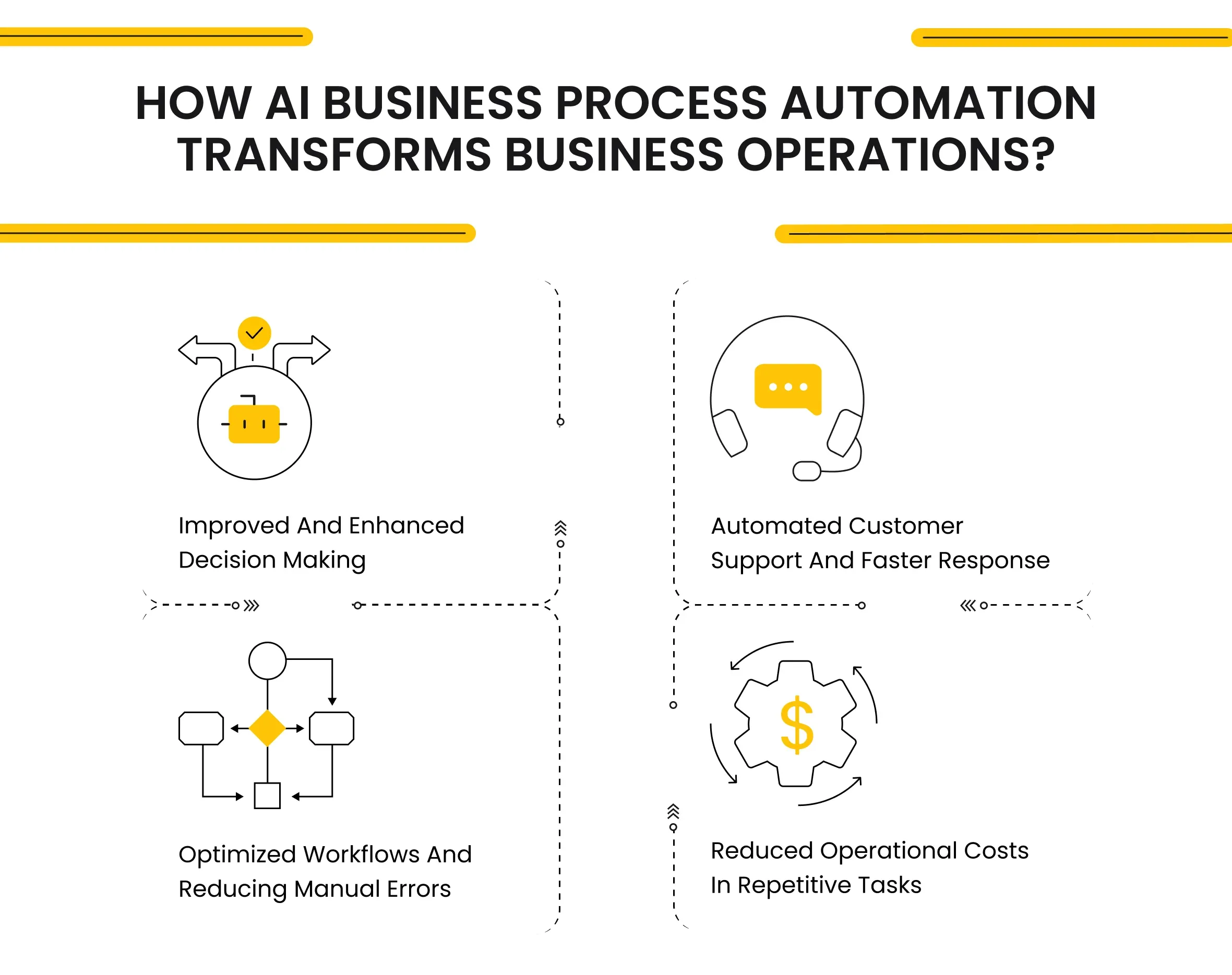
So, what other business process automation use cases exist, and how to use AI to automate tasks efficiently?
To simplify it, the best examples of business process automation with AI include:
- Optimized Workflows and Reducing Manual Errors
- Automated customer support and faster response times
- Improved decision making
- Reduced operational costs in repetitive tasks
One of the most beneficial features of AI workflow automation is that the previous list is not either/or, i.e., with a single solution based on artificial intelligence, your business can achieve at least a few, if not all, benefits of business process automation with AI.
Optimized Workflows and Reducing Manual Errors
First, AI for business process automation helps optimize workflows and reduce manual errors caused by human factors.
To simplify, AI-driven workflows have clear instructions on how to behave in different cases. So, when AI defines the scenario for performing a certain task, it is always done in the same way.
Such an approach shows efficiency in two ways:
- AI works 24/7 and can perform workflow tasks immediately, reducing expectations and delivery time. As a result, it speeds up workflow, decreasing the time for implementation. This is especially important for software upgrades and other updates.
- AI has instructions on how to behave in each case, helping to avoid human errors or other mistakes. However, suppose the task can’t be performed due to some factors. In that case, it notices specialists responsible for related processes and operations so that employee experts can take a look and decide how to deal with these tasks. So, either way, AI-driven business process automation shows fewer mistakes than entirely manual.
Summarizing all the above, AI business automation shows excellent efficiency and success rates, helping companies streamline operations without errors or other related challenges.
Automated Customer Support and Faster Response Times
Once again, AI-driven chatbots can reply immediately. This makes them an ideal tool for customer support services.
Using chatbots based on artificial intelligence for customer support is one of today's most popular and efficient cases. Besides being easy to integrate and train an AI for such use, companies can benefit significantly from custom support automation:
It can save expenses by automating primary responses like FAQs or simple business-related questions. At the same time, employees responsible for customer support and satisfaction can be engaged in more demanding and complex tasks, increasing the efficiency of support services and reducing the response time.
Finally, chatbots reduce response time by up to a few seconds, regardless of the question or request. If you faced manual customer support services, you might know how random the response time can be. This inconvenience negatively impacts customer satisfaction.
Improved Decision Making
Advanced capabilities of data analysis of artificial intelligence also help to streamline decision-making.
It doesn’t mean that all decisions should be assigned to AI modules. However, it can be a powerful instrument that helps employees make the right choices. For instance, such virtual assistants can be used to check suggestions and assumptions or as a data source and summary of different information on topics for further decisions.
Still, we highly recommend utilizing AI as an additional data source, not the primary one. There is much evidence that most common AI solutions, like ChatGPT, are biased and can suggest wrong or misleading suggestions because they are still under training and development.
Don’t forget that artificial intelligence and machine learning are relatively new technologies that require polishing and improvement.
Reduced Operational Costs in Repetitive Tasks
Finally, the most apparent reason to use AI in business process automation is its capability to streamline repetitive tasks.
Such a feature helps to significantly reduce operational costs by saving human resources and achieving the same, if not better, results and performance. As mentioned before, AI solutions can be involved in multiple business tasks and processes, offering benefits for each.
So, in addition to automating some basic business operations, it can be trained for other advanced assignments. Besides, you don’t have to maintain a full-fledged software development process at once.
For example, you can apply a custom software development service to integrate an AI solution first. Then, even a single developer familiar with AI technologies can adjust and train it for new operations on demand. In other words, artificial intelligence is a very flexible software solution that can be trained and prepared for different tasks.
The most complicated challenges are correctly integrating such solutions into your business and training them properly to ensure the quality and accuracy of their responses.
How Does Incora Provide AI Business Process Automation Solutions?
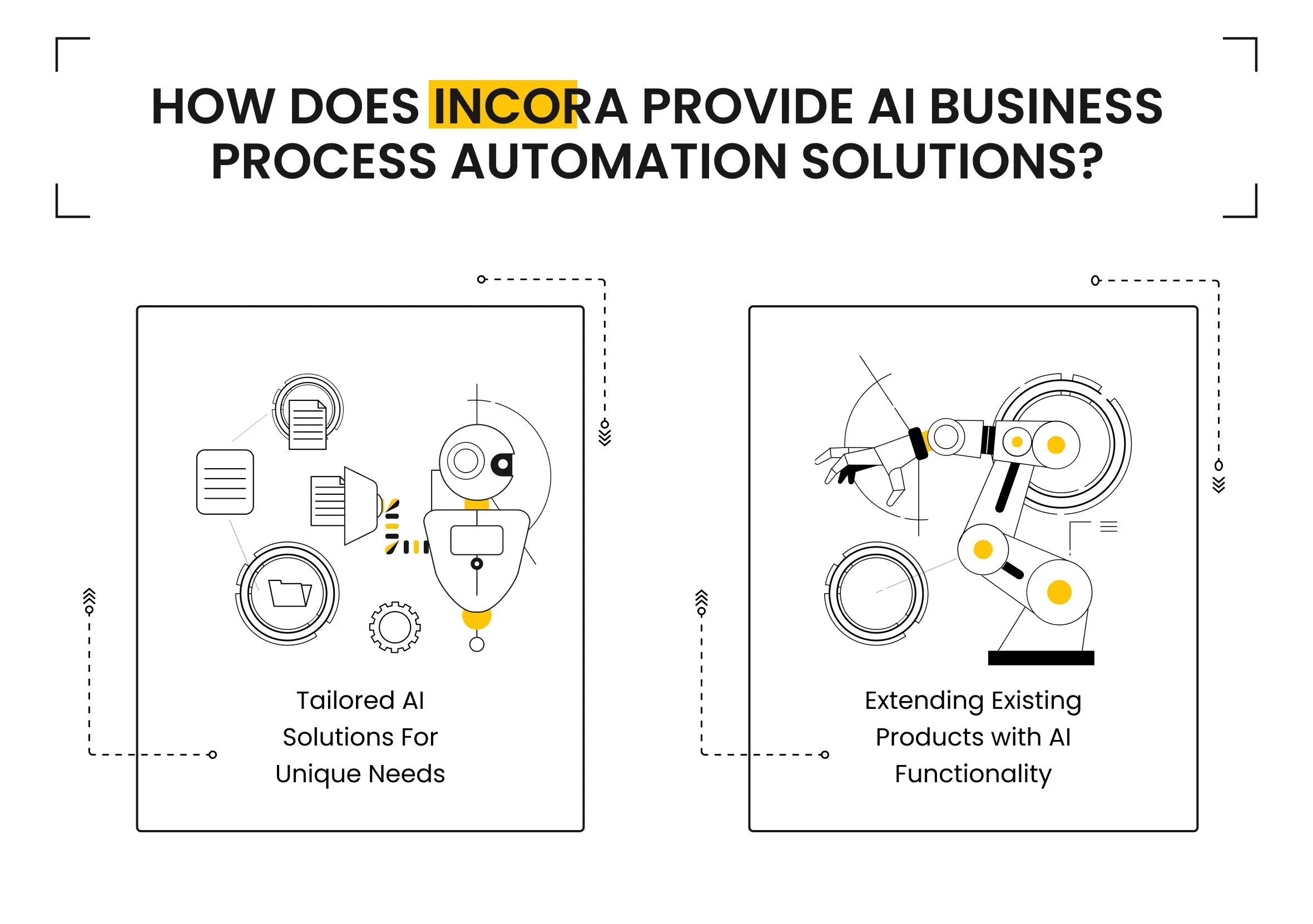
So, let’s consider AI business process automation in real-life examples. For illustration, let’s examine some of our recent case studies that involved AI integration, training, and development.
Frankly, we can divide these cases into two types:
- Tailored AI Solutions for Unique Needs
- Extending Existing Products with AI Functionality
Despite the general nature of modern AI solutions like ChatGPT and their flexibility, sometimes it is better to transform them into something other than an all-in-one solution. Instead, we offer first to perform business analysis and project discovery to define the core business needs to be satisfied.
Therefore, in terms of projects for tailored AI solutions for unique needs, we took part in planning and creating specific AI-driven software for particular business needs. Such a project can take as much time as integrating a general AI, but it offers more precision and efficiency.
Apart from integrating and training existing AI models, such integrations also require extensive coding and software scaling to ensure success. They have more in common with custom software development from scratch than simple integrations.
On the other hand, extending existing products with AI functionality requires more adjustment and training processes than coding. Such software scaling takes less time yet shows less unique or astonishing functionality.
Besides the differences in software development practices and approaches, such projects also vary in their priorities:
- Tailored solutions are AI-first, meaning that such functionality is one of the most crucial features offered by business software
- AI-based functionality extensions are supplemental, offering extra, less crucial service features.
Tailored AI Solutions for Unique Needs
We can name several software projects that involved AI integration and development.
Among the latest cases, we can name blackbird.ai and voiceorder.ai.
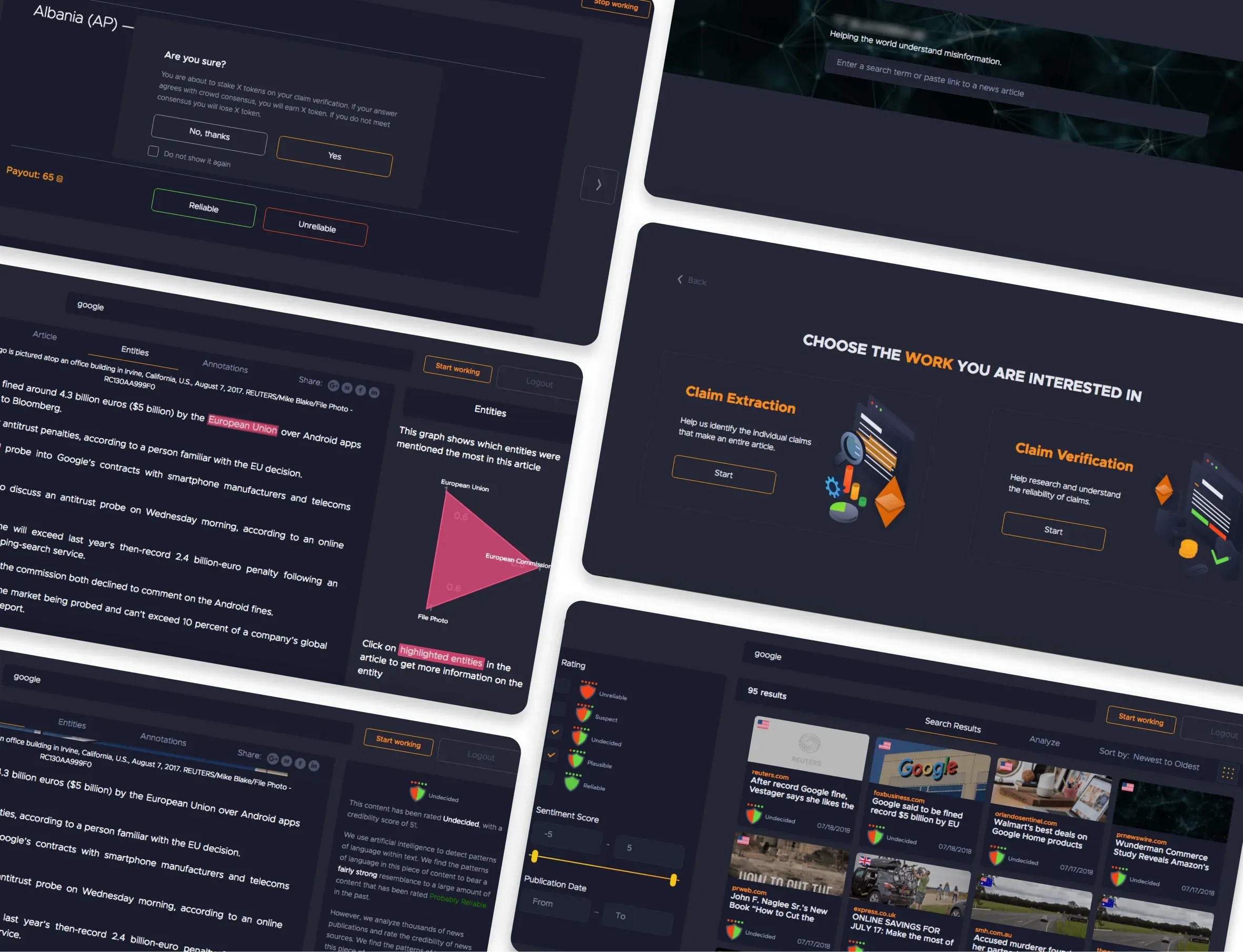
BlackBird.ai utilizes artificial intelligence to analyze information and detect misinformation to prevent it. Unique AI-driven algorithms define the credibility of various resources and track how often they post misleading or unauthorized information.
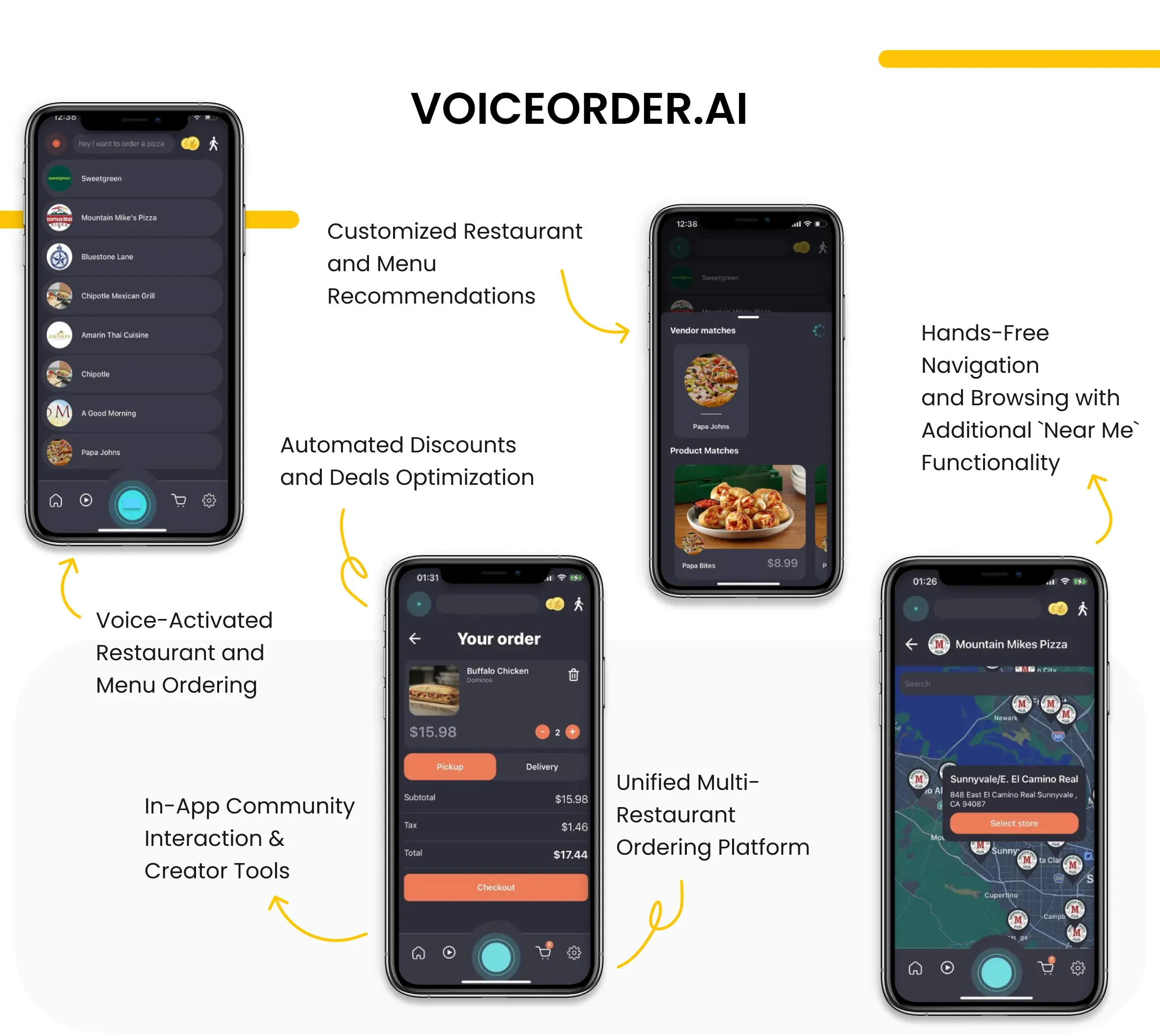
VoiceOrder.ai is a Siri-like application capable of distinguishing human speech, processing it, and placing delivery orders. AI is crucial for this software because it processes speech, performs speech-to-text transformation, and performs requests. Apart from that, a built-in AI module is used to analyze the offers nearby and look for discounts and other bonuses to provide customers with more favorable offers.
Extending Existing Products with AI Functionality
Frankly, we have many more projects that involve extending existing functionality. Still, most of them were developed under NDA, so Riel is the only project involving AI business process automation we can talk about.
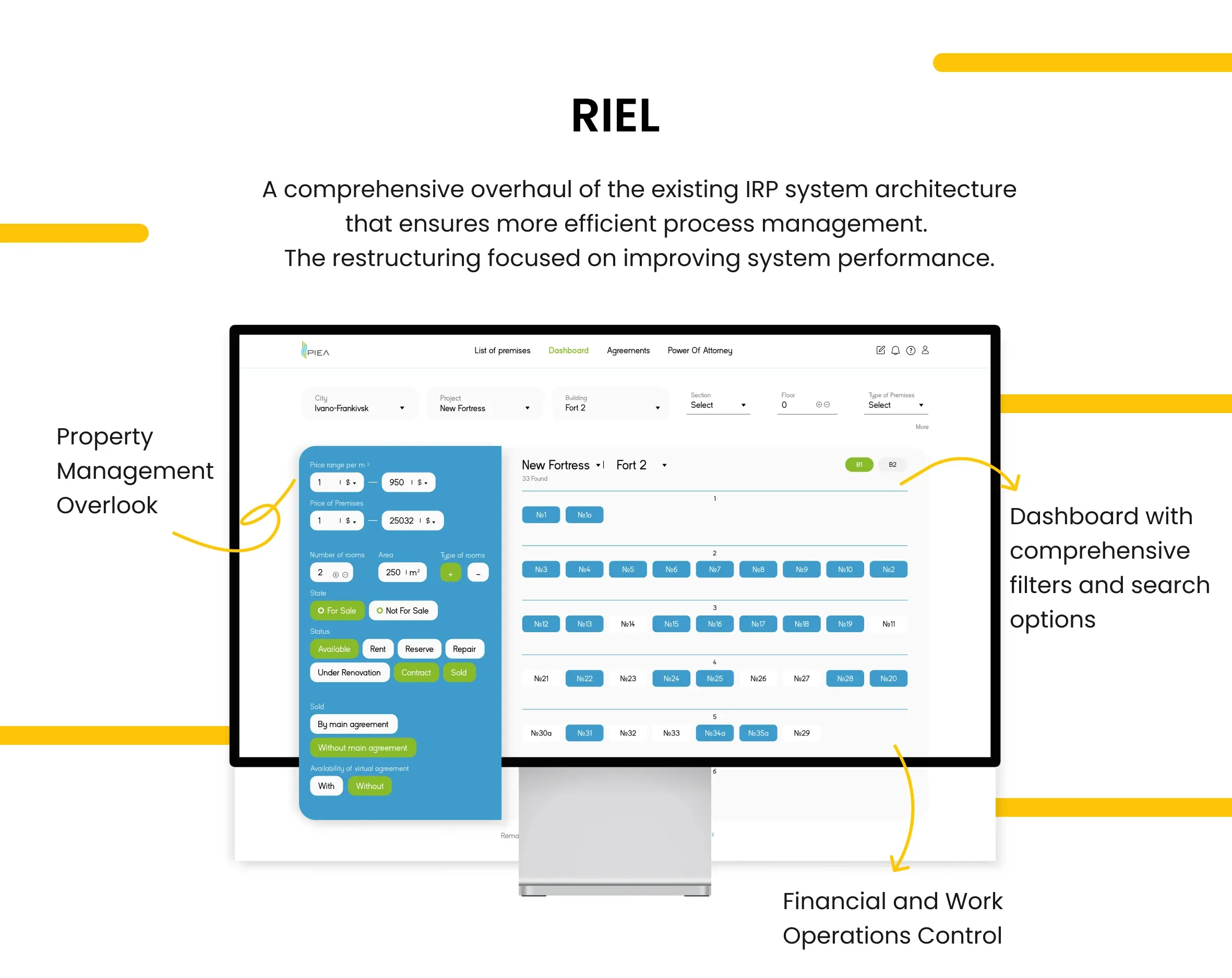
Riel is a huge Ukrainian real estate company that contacted us looking for AI software solutions to streamline its customer support services.
In terms of our cooperation, our Incora developers incorporated existing AI modules into their IT system and took part in optimizing the existing software infrastructure.
As a result, Riel managed to automate most basic communication practices and reassign their customer support specialists to more complex requests that required a personalized approach.
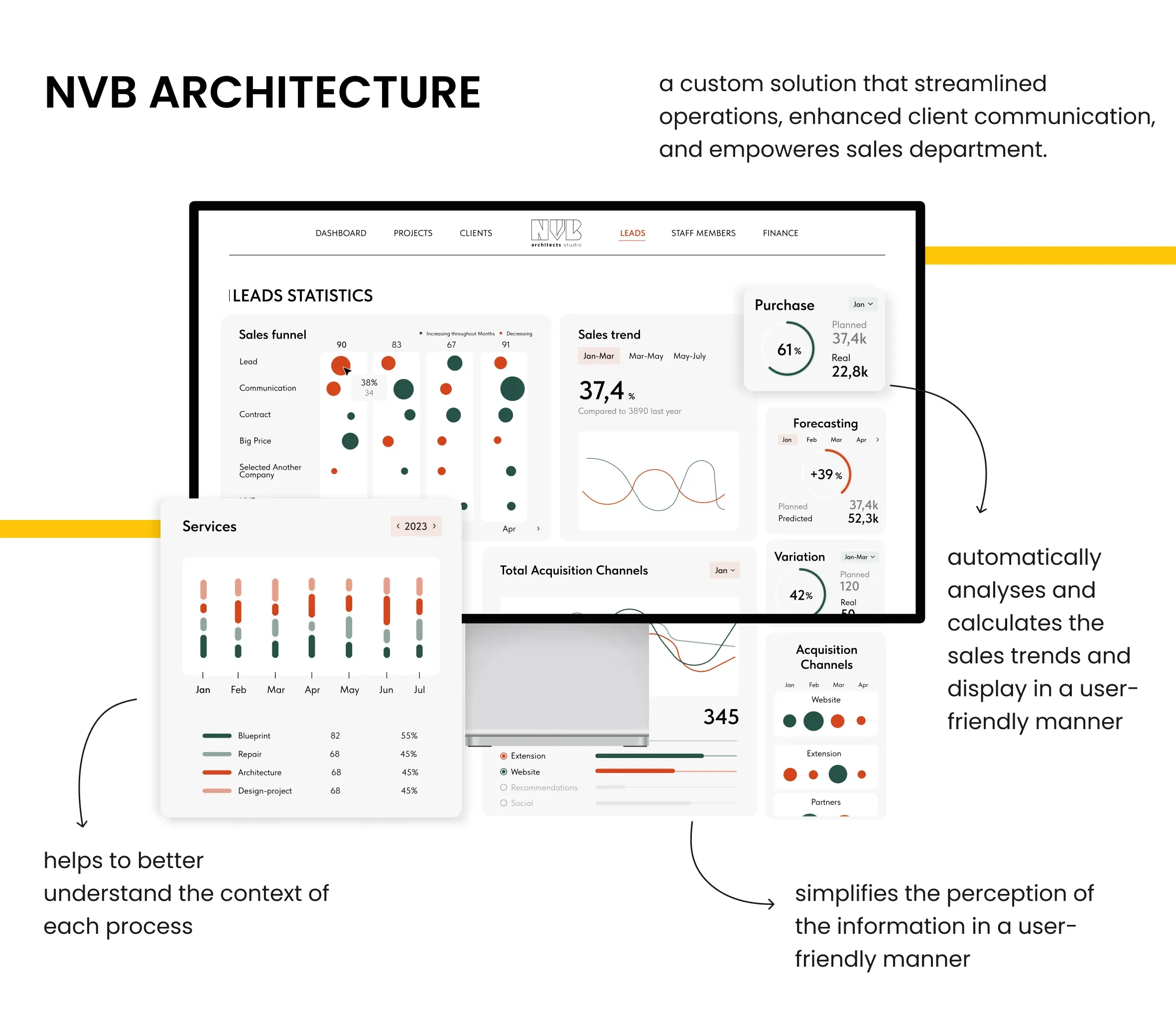
Summing up all the above, artificial intelligence is a great and robust instrument that can bring numerous advantages and features to your company. AI business process automation is just one of them.
Such flexibility and a vast number of use cases are among the core reasons to invest in AI-powered business process automation solutions: increasing the efficiency of business services or software and saving time and resources by streamlining manual and repetitive tasks is just the first step to learning the true potential of AI-based software solutions.
What’s your impression after reading this?
Love it!
1
Valuable
1
Exciting
1
Unsatisfied
1
FAQ
Let us address your doubts and clarify key points from the article for better understanding.
What is the role of ai in business process automation?
AI in business process automation streamlines operations by automating repetitive tasks, analyzing data for decision-making, and enhancing efficiency. It helps businesses reduce costs, improve accuracy, and deliver better customer experiences by optimizing workflows, enabling predictive analytics, and supporting intelligent decision-making.
Which business processes can be automated with AI?
AI can automate processes like customer support (chatbots), data entry, inventory management, marketing personalization, fraud detection, recruitment screening, and financial reporting, among others.
Why businesses should invest in AI business process automation?
Businesses should invest in AI business process automation to increase efficiency, reduce costs, minimize errors, improve decision-making, and enhance customer experiences, giving them a competitive edge in the market.
What are the benefits of AI and automation of work for businesses?
AI and automation benefit businesses by boosting productivity, reducing operational costs, improving accuracy, enabling faster decision-making, enhancing customer satisfaction, and allowing employees to focus on higher-value tasks.
YOU MAY ALSO LIKE
Let’s talk!
This site uses cookies to improve your user experience. Read our Privacy Policy
Accept
Share this article